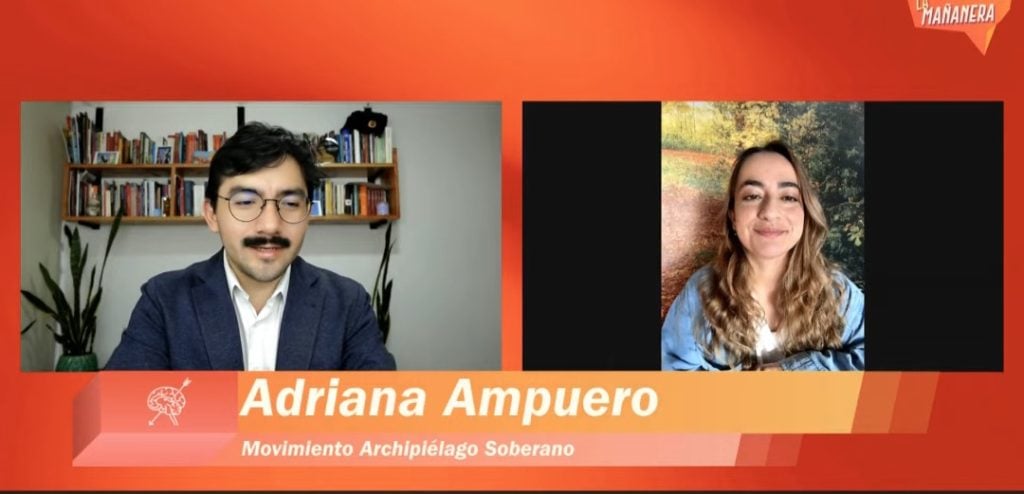Original article: “Hay un payaseo político detrás de la Ley Lafkenche”: Adriana Ampuero exige respeto a las comunidades y un debate serio
Adriana Ampuero, a candidate for deputy in District 26 representing the Green, Regionalist, and Humanist Pact, criticized the «political maneuvering behind the Lafkenche Law«, designed to protect the customary rights of indigenous peoples over coastal territories. She demanded respect for indigenous communities and urged the establishment of a serious debate.
In a conversation on Thursday with La Mañanera, Javier Pineda Olcay, director of El Ciudadano, asked the law graduate from the Pontifical Catholic University of Valparaíso about the situation of indigenous peoples in Chiloé.
Ampuero challenged the evident «political exploitation in relation to the Lafkenche Law.»
«There has been a great deal of interference and lobbying from large industries, which has created a conflict between fishermen and the indigenous peoples of our territory, which has been poorly managed as they are being taken advantage of,» she stated.
Enacted in 2008, this law is essential for protecting the customary rights of indigenous peoples in managing marine territories. Through the Coastal Marine Spaces for Indigenous Peoples (ECMPO), it has enabled indigenous communities to preserve their traditions and manage natural resources sustainably.
However, a legislative proposal to amend this regulation has sparked intense controversy among lawmakers and indigenous communities.
The former constituent indicated that «candidates closer to the right or the center are advocating for the repeal of the Lafkenche Law, which is quite complex to propose in practical terms since this law is part of the ILO Convention 169.»
«Thus, many times when legislative measures are proposed, the Constitutional Court dismisses them. It’s somewhat populist to say that we will end the Lafkenche Law because, in reality, there are constitutional issues and international treaties involved,» she pointed out.
Ampuero believes that any modifications to the Lafkenche Law would require agreements from all parties, as well as the establishment of a dialogue table.
«And that is precisely the point that politicians overlook. Politicians have their ideas, their factions, their respective lobbies, and they try to do as they please, which just doesn’t work,» she asserted.
«We discussed this recently in a debate in Quellón, where indigenous peoples attended. We talked about this issue, and they told me that they agree with me that they have been politically used, that this is not a law that can simply be altered without considering their opinions. I imagine the fishermen feel the same way. I don’t believe they feel very different from the indigenous peoples. Those I have spoken to have confirmed this to me. Therefore, I feel there is a bit of political buffoonery surrounding the Lafkenche Law; it has not been addressed seriously,» she emphasized.

«Salmon Farms Are Exporting More and Earning More, but Not Creating More Jobs»
During her interview on La Mañanera, the candidate was also asked about the situation in the Los Lagos region regarding salmon farming companies, and the tension between environmental protection and job creation in District 26, which includes the municipalities of Calbuco, Cochamó, Maullín, Puerto Montt, Ancud, Castro, Chaitén, Chonchi, Curaco de Vélez, Dalcahue, Futaleufú, Hualaihué, Palena, Puqueldón, Queilén, Quellón, Quemchi, and Quinchao.
«I would say there are some tensions there. For example, salmon farms are growing in terms of exports. They are producing more, exporting more, and thus earning more, but they are not creating more jobs. So there is a noticeable tension because this territory largely relies on salmon and viticulture employment. That is the first tension,» she indicated.
She noted that the second tension relates to the «negative externalities of the salmon farming industry.»
«There is little redistribution in the territory. In the north, for example, there are mining municipal funds, but here we do not have salmon municipal funds. The topic of the salmon royalties sounds significant, which is also a proposal from the Regionalist Green and Social Federation,» she explained.
She also mentioned a «strong lobby» from political candidates of right-wing parties who have emphasized that they are in defense of the salmon farms, but it is not clear whether they are defending the owners of the salmon farms or the workers within them.
«So that is a constant debate in parliamentary matters,» Ampuero pointed out.
Polarization Ahead of the Presidential Elections
Regarding the presidential race, the Chilota lawyer and leader of the Sovereign Archipelago Movement stated that the atmosphere in the archipelago is highly polarized.
«It’s not very different from what is happening in the country, but I would dare to say that the names that are most prominent here are probably Jeannette Jara (Unity for Chile) and Johannes Kaiser (Libertarian National Party). So, there is a bit of a dispute between the two ideological poles (…) I could be mistaken, but that is what we have been able to gauge on the ground,» she said.
In the latest episode of La Mañanera on Thursday, November 6, our director analyzed the corruption crisis affecting the judiciary and also interviewed Gonzalo Prieto, Director of Prevention and Public Safety of the Municipality of Iquique.
You can watch the full program below:



